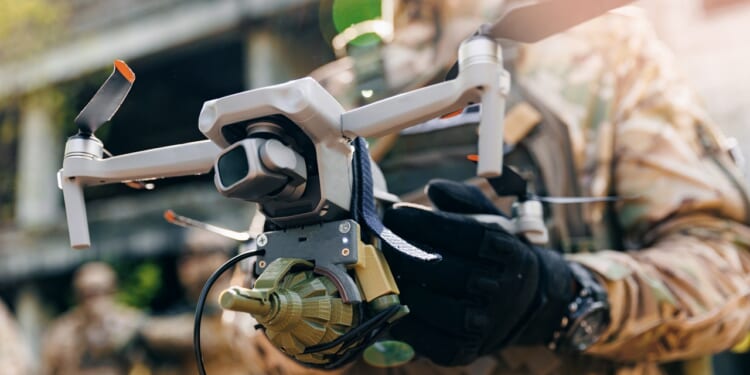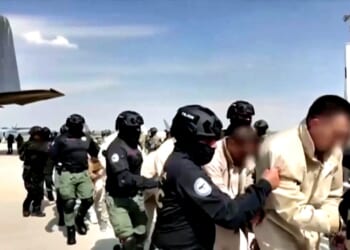Although there is no proof that the Kremlin is behind the most recent incident, it would come as part of a month-long pattern of airspace violations against the Baltic states.
Days before Russian military aircraft violated Lithuanian airspace, another incident occurred in Estonia. The previously undisclosed incursion involved a pair of unmanned aerial vehicles (UAVs) spotted near Camp Reedo, about 30 miles from the Russian border.
According to reports, on October 17 at around 4:30 pm local time, the UAVs approached the military base, which hosts the United States Army’s 5th Squadron, 7th Cavalry Regiment. One of the two drones was shot down via an “anti-drone rifle,” and the second flew off.
It isn’t clear if the UAVs were Russian, but the Kremlin has been increasingly brazen in its activities near the Baltic states (Estonia, Latvia, and Lithuania). Several Russian drones had also entered Polish airspace in September. However, news of the most recent drones near the base largely flew “under the radar.” Estonian defense spokesperson Liis Vaksmann confirmed the incident in an interview with a local news outlet, but she did not comment further.
“The armed forces do not comment in detail on security-related incidents,” Vaksmann explained.
Estonia Vows a Hard Line Against Russian Incursion
Tallinn has already indicated that any future violation of its airspace could be met by force, after three Russian Aerospace Force Mikoyan MiG-31 (NATO reporting name “Foxhound”) fighter jets entered Estonian airspace over the Gulf of Finland and remained there for roughly 12 minutes. The Russian aircraft, which lacked flight plans and had their transponders switched off, were intercepted by the Italian Air Force, which was participating in the NATO Baltic Air Policing (BAP) mission.
“The message must be unequivocal—future violations will meet a response, including, if necessary, the interception and downing of intruding aircraft,” warned Estonian Foreign Minister Margus Tsahkna in a briefing with the media last month. “This is not only about defending Estonia’s borders—it’s about defending NATO’s borders.”
Estonia, a member of NATO since 2004, shares a 180-mile (290 km) border with Russia, making it one of the most exposed frontiers of the international military alliance.
Lithuania Is Also Dealing With Repeated Airspace Violations
The report that drones flew near an Estonian military installation coincided with recent Lithuanian allegations that two Russian aircraft entered its airspace last week. A Sukhoi Su-30 (NATO reporting name “Flanker-C/G/H”) multirole fighter and an Illyushin Il-78 (NATO reporting name “Midas”) four-engine aerial refueling tanker flew about 765 yards (700 meters) into the Baltic nation’s territory before turning back.
The violation is said to have lasted a total of 18 seconds.
The Russian Aerospace Force’s aircraft were believed to be conducting a refueling exercise in the Russian exclave of Kaliningrad when the breach of Lithuanian airspace occurred. Two Spanish Eurofighter Typhoon jet fighters, deployed to the region as part of the BAP mission, were immediately sortied and flew to the border.
The governments of Estonia, Latvia, and Lithuania understand all too clearly that their countries would likely be the first to be invaded should a war break out with Russia. Defensive measures have been stepped up. In August, Estonia deployed new metal gates and additional barriers at the Narva border crossing with Russia, while earlier this month, Lithuania began to fortify its frontier with the Russian exclave of Kaliningrad with the installation of “dragon’s teeth” anti-tank defenses.
The three nations, along with Poland, announced earlier this year that they could resume production of landmines to further bolster the defenses along the frontier with Russia and its ally Belarus.
About the Author: Peter Suciu
Peter Suciu has contributed over 3,200 published pieces to more than four dozen magazines and websites over a 30-year career in journalism. He regularly writes about military hardware, firearms history, cybersecurity, politics, and international affairs. Peter is also a contributing writer for Forbes and Clearance Jobs. He is based in Michigan. You can follow him on Twitter: @PeterSuciu. You can email the author: [email protected].
Image: Shutterstock / Parilov.


















